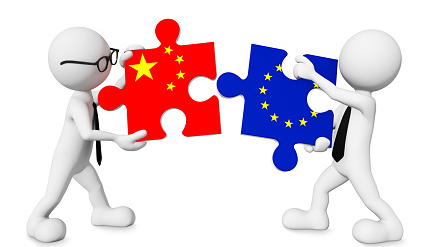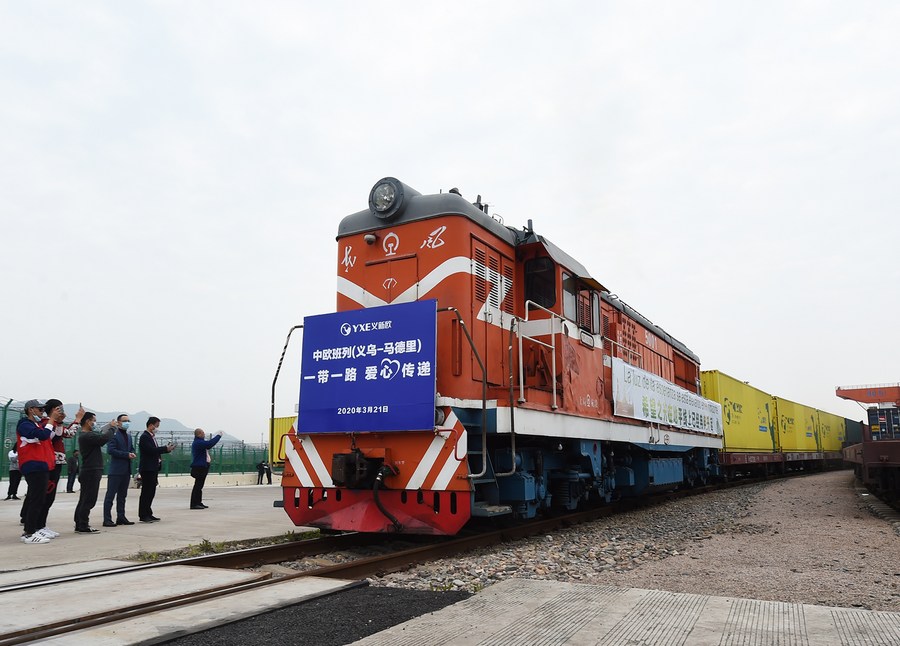
Editor's note: Bobby Naderi is a London-based journalist, guest contributor in print, radio and television, and documentary filmmaker. The article reflects the author's opinions, and not necessarily the views of CGTN.
Forget about the frequent doses of propaganda and soothing assurances from clueless currents that make occasional forays into reporting that is critical of relations between China and the European Union. The powerful reality is this:
German Chancellor Angela Merkel has warned Berlin and the EU against severing all connections with China, arguing that whatever its cause, "it would be damaging for us." Merkel also said Germany and the EU should continue to cooperate with China and could learn from one another.
Talk of truth which can stand by itself. The nature of current trade relations between China and the EU does indeed make decoupling more unlikely. Despite the differences, the two sides neither have a distaste for globalism nor any intent to divide a tightly linked bilateral trade system. The two economies are far more integrated than ever before, and economic cooperation benefits both sides in a range of fields and sectors.
According to the latest data from Eurostat, China is the EU's largest trade partner despite the global economic downturn and pandemic. The thriving trade and economic links helped China overtake the U.S. last year to become the EU's largest trading partner. It is in their shared interests if this healthy bilateral trade continues the momentum as there is no alternative.
China relies on the EU's consumer market to support its export-led growth model, while the EU depends on China as its fastest-growing export market and investor through the Belt and Road Initiative, the biggest infrastructure development project on the planet. This concrete and risk-free geostrategic partnership has been reinforced by integrated networks of production, innovation and finance.
The focus for the two partners is also on shared values around climate change, free trade and economic globalization by means of funding and encouraging private investment worldwide. The translation is that China means business on free trade and emissions reduction. It already pledged to reach net-zero carbon emissions by 2050 as part of a deal with the United States struck at the COP26 Climate Summit in Glasgow. The crystal clear agreement has been hailed by the EU and other members of the international community.

A China-Europe freight train bound for Madrid of Spain carrying two containers of medical supplies and other goods departs the city of Yiwu, east China's Zhejiang Province, March 21, 2020. /Xinhua
A China-Europe freight train bound for Madrid of Spain carrying two containers of medical supplies and other goods departs the city of Yiwu, east China's Zhejiang Province, March 21, 2020. /Xinhua
This development is significant because in addition to rare earths, the EU needs China for its planned green transition to import cobalt and lithium for electric vehicle batteries and energy storage. China holds a large share of global production and output of refined cobalt and lithium. The EU's plan to fulfill its green transition will not go away even if it decides to work against Chinese interests.
On that same note, China-EU strategic partnership and integrated industrial chain are intertwined into the global economy and multi-country supply-chain linkages. This makes any trade diversion with China outside the EU pervasive and disruptive as well, in real terms through trade flows and in financial terms through capital flows. Any attempt to drive a wedge between China and other economies through dual circulation and mercantilism would bring unprecedented challenges to their beneficial partnership.
The skeptics and clueless media outlets, of course, would be the last to take into account all these considerations and more. Instead, they would try to get in the way of the healthy development of bilateral connections through political manipulation and smear. They may never admit that they are the root of any regrettable and unacceptable tension between China and the EU, responsible as they are for focusing on differences, China blame game, and conflict phase of co-dependency.
The good news is that the European Commission, which negotiates trade deals for the 27 EU countries, already moved ahead with an investment agreement with China in principle. Merkel made it clear that the road ahead is for Brussels to respect facts and reality. The Comprehensive Agreement on Investment should never face any tough path to ratification, underscoring just how important it is for Brussels to balance its economic interests with picking sides, especially as Washington seeks allies to challenge China's rising economic importance.
All that being said, the investment agreement which aims to promote sustainable development and improve access for EU investors to China's market economy is in Brussels' interest to finalize. It will create a better balance in the EU-China trade relationship. In terms of market access for EU businesses, greater economic cooperation could benefit both sides. The biggest risk is to rearrange foreign relations, geopolitical interests and position with China, and to have no strategic autonomy in the foreign policy field.
Due to the importance of China for EU exports and foreign investment income, there is considerable risk that decoupling would hurt bilateral trade and investment. This would raise input costs and endanger the green transition for the EU. It's also a recipe for future troubles for other trading partners, with a broader economic impact on the global economy.
(If you want to contribute and have specific expertise, please contact us at opinions@cgtn.com.)

